Master of Disguises
The Collector of Worlds, Lliya Troyanov, 2009
A wonderful novel written by a Bulgarian in the German language about an Englishman, the legendary Sir Richard Francis Burton. Unlike the more famous T.E. Lawrence sixty years later, not much fiction has been written about Burton. This novel deals with three distinct phases or adventures of Burton’s event filled life; his early time in India as employee of the East India company from 1842-1849; his Hajj (holy pilgrimage to Medina and Mecca) in 1851-1853; and his expedition to East Africa in 1858 to discover the source of the River Nile. The structure of the novel alternates short chapters (usually a page or two) with descriptions of events as they happen to Burton followed by after the fact discussions with Burton’s servants or Ottoman (Turkish) officials in Muslim year 1273 (1856) corresponding or discussion the Hajj, accounts of which, Burton has published in English.
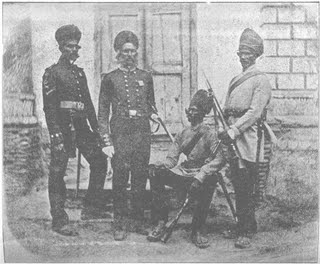
Sepoys
In India we are introduced to a young Burton who is already proving to be gifted in acquiring languages. His first assignment is in Baroda (near Bombay) where he hires a servant to set up his household and find a teacher of Gujarat. Burton’s job is to drill some Sepoys (Indian native soldiers) a few hours a day which leaves him with a lot of time on his hands.
The servant, Naukaram, stays with Burton throughout his time in India and returns home to England with him. Burton finally dismisses Naukaram with a simple letter acknowledging his employment term but giving no details of his duties or experiences. Naukaram, who is illiterate, seeks out a lahiya (letter writer) to create a resume he can use to seek employment with another Englishman. The lahiya is immediately captivated by Naukaram’s story and continues to ask questions, take notes, and draw the servant out. The simple letter takes days, then weeks to prepare (is the lahiya writing a book?) and costs Naukaram all the money he can borrow to continue the work.
We learn that Naukaram finds Burton a Brahmin teacher, Upanishe, who imparts far more than the Gujarat language and Sanskrit. Burton is soon immersed in Hindu culture, myths, and literature, including the Kama Sutra. Burton is so talented, Upanishe suggests he dress in native clothes and pose as a cousin from Kashmir for Upanishe’s visitors and friends. Burton is a big success and his career as a master of disguises is launched.
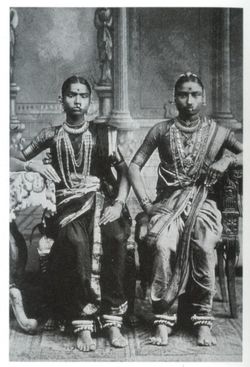
Devadasi
Naukaram also finds Burton a courtesan, Kundalini, to become his mistress (Naukaram is also in love with her). She was sold as a young girl to a religious house to be trained and serve as a devadasi (where she sexually serves the priests). She runs away and is living in a Bordello in Baroda where Naukaram finds her. Kundalini instructs Burton in the art of love, forcing Burton to listen to her stories at key moments.

Burton’s English Translation of the Kama Sutra
Burton is transferred to Sind (Sindh) to join a survey team (he is terrible at surveying) where he turns to the serious study of Urdu and Farsi. In Sind, he effects the disguise of a Persian Dervish and manages to befriend a Pashtun who is dedicated to undermining British authority in the region. Burton becomes a spy reporting to the local British general. The British raid the rebel’s house (the rebel is not home) and arrest Burton. Rather than give away his disguise, he keeps up his act in prison. Naukaram attempts to convince the jailers that Burton is English but they have discovered Burton is circumcised (that he had the operation performed illustrates how far he is committed to his disguises.) so could not possibly be English. Naukaram finally is able to get a message to the British general who gets Burton released, but not before Burton is tortured in an attempt to learn the whereabouts of the rebel. Burton is a broken man and is given a two year leave of absence to return to England. Burton insists on wearing a garish hodgepodge of Indian and Persian clothing in Europe. Naukaram gets to see England, France, and Italy before he is dismissed.
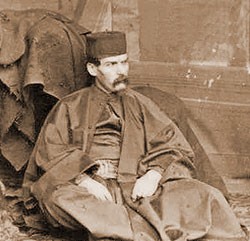
Burton in Turkish Disguise
In the second part, we find Burton in Cairo, once again in the disguise of a Persian Dervish. He is seeking Egyptian permission to travel to Suez for the start of his Hajj. He gets the permission and again seeks out a local teacher to learn the details he will need for his trip. The teacher immediately suggests that performing the Hajj as a Shia will be difficult if not outright dangerous and suggests that Burton (the teacher believes he is Persian) pretend that he is a Pashtun Suni from India. Burton agrees but keeps his identity as a Sufi Dervish. He tries out his new identity by treating Egyptians for medical problems. He is a great success and no one ever suspects he is not what he says he is.

He begins his Hajj and we are treated to camel caravans, crowded boats, Bedouins bandits, and other travails of the pilgrimage. Burton appears to be truly moved by the Hajj experience and receives his letter of certification from the religious authorities.
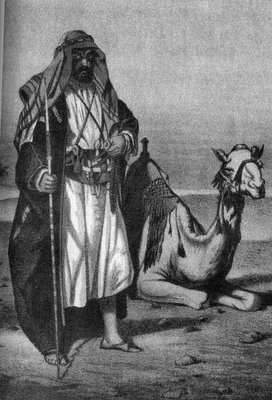
Burton as Arab on Hajj
After Burton’s book describing his Hajj experiences is published, we read correspondence and listen to conversations between Ottoman officials as they try to discover if Burton was an English spy, scouting out the Muslim holy land for possible conquest. If Burton was an English spy, why don’t the English honor him? Maybe he was spying for France, but that doesn’t seem to make sense. Could he possibly be a true Muslim believer? Impossible, all westerners are unbelievers as we know. They interview and occasionally torture people Burton encountered or who hosted Burton during his Hajj but all are convinced Burton was a sincere believer and very knowledgeable on all things Muslim. The inquiry is inconclusive.
Finally in the third part, we catch up with Burton in 1858 as he and fellow English explorer Speke set out to find the source of the Nile. It is Burton’s last chance to gain fame and recognition which have so far eluded him. He hires a former slave Sidi Mubarak Bombay in Zanzibar to guide him and the hundred porters for the trip. They are credited with the discovery of the source of the Nile (Lake Victoria) but Burton was abed suffering from Malaria when Speke explored the Lake and found the river flowing out of it. A jealous Burton would later say that the claim was unproven until someone actually ventured down the river to prove it was the Nile.
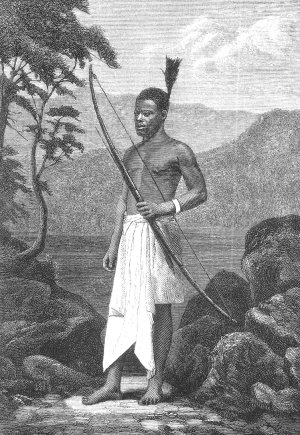
Bombay Aka Chuma
Bombay has been a slave his whole life and knows little of his own people or their language. He finally ends up belonging to an Indian living in Bombay where he adopts the name of his master’s city. Bombay is freed when the master dies and Bombay returns to Zanzibar to live. We encounter the trip from the real time account of Speke and Burton interspersed with the stories told years later by Bombay as he entertains throngs of listeners with his tales.
Bombay is puzzled when the Englishmen insist they are “discovering” lakes, mountains, and rivers that have been known to the Africans forever. When Speke starts giving English names to his discoveries, like naming the lake Victoria, he also asks Chuma for the African names of the features. Chuma thinks this arbitrary English naming is an interesting idea and starts inventing his own humorous, sometimes obscene African names which Speke dutifully writes down alongside his own English names. When Chuma later sees the first printed European map of the area, printed alongside the English names are the fanciful names Chuma has invented. Chuma is delighted.
A charming novel about a caustic, impossible character.